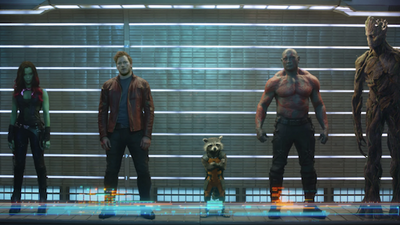Quill defines them all as “losers” at one point in the story. The description is not as self-flagellating as it initially might seem. He’s reclaiming the word by redefining a loser not as somebody who cannot or will not “win” but as somebody who’s lost something precious but keeps going anyway.
No other character in the MCU franchise is as believably and fully human as the mostly non-human ensemble assembled by Gunn in the “Guardians” films. Like the rest of us, they do things for reasons they don’t understand. And they usually strain to justify their actions later, in terms that often don’t make rational sense, or try to lie or cover up their actual reasons for doing things, often as a way of saving face in front of a group that treats locker-room style verbal jousting as a bonding mechanism. Gunn also has a rare gift for writing lyrically deluded comic characters who become funnier and funnier the more they dig in their heels defensively when another character successfully defines them, as when Rocket warns that the strongman Drax (Dave Bautista) cannot understand figurative language because his people are “completely literal…metaphors go over his head,” and Drax huffs, “Nothing goes over my head. My reflexes are too fast. I would catch it.”
Gunn was the beneficiary of a lot of lucky breaks in making the “Guardians” movies, the first one especially. A big one was Marvel supervising producer Kevin Feige’s willingness to say yes to the most off-brand of MCU movie adaptations. If Thor, Iron Man, Hulk, and Captain America were the comic book equivalent of a band’s greatest hits, “Guardians” was what a pre-Internet DJ would call a “deep cut.” But this proved to be a great creative advantage because there weren’t legions of fans champing at the bit to hyper-critique every aspect, and that freed Gunn to make, well, a James Gunn superhero movie. (That’s something the general audience had no sense of at that point unless they’d seen Gunn’s R-rated “Super,” a perverse and subversive vigilante satire starring Rainn Wilson of “The Office” that owes more to “Taxi Driver” than “The Punisher.”)
Another advantage was timing. Disney, via its recent acquisition of LucasFilm, was generating a new trilogy of “Star Wars” movies around the same time the MCU entered its cultural dominance phase and Gunn was in production on the first “Guardians.” But the first entry in Gunn’s trilogy came out almost a year-and-a-half before the first new “SW” film in ten years, J.J. Abrams’ “The Force Awakens,” which meant that the brand new and shiny, according-to-Hoyle “SW” film got compared (sometimes unfavorably) to “Guardians” rather than the other way around. The first movie was not only a huge enough hit to not seem like an underdog in relation to LucasFilm products, it was more cohesive and original. All in all, it got closer to capturing the appeal of the original, medium-redefining 1977 “Star Wars” than “Force Awakens” because of its total commitment to the “band of random losers saves the cosmos” storyline. (The “Star Wars” sequels ultimately abandoned the democratic spirit they tried to impart in “Force Awakens” and “The Last Jedi” by reverting in “The Rise of Skywalker” and tying things back to the same damn royal family the storytellers had supposedly been trying to escape the shadow of.)

